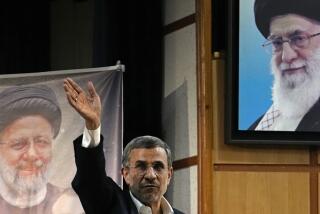PLO’s Barghouti Ends Candidacy for President
- Share via
JERUSALEM — Less than two weeks after declaring his candidacy, imprisoned uprising leader Marwan Barghouti has abandoned his bid to become Palestinian Authority president in the Jan. 9 election, his campaign manager said Sunday.
The move appears to clear the way for Mahmoud Abbas, the new chairman of the Palestine Liberation Organization and the official candidate of its dominant Fatah faction, to succeed the late Yasser Arafat as Palestinian Authority president.
At a news conference in the West Bank city of Ramallah, Barghouti’s campaign manager, Ahmed Ghneim, announced that Barghouti was throwing his support behind Abbas and withdrawing from the campaign to preserve Palestinian unity.
Ghneim read a three-page letter from Barghouti in which the former candidate lashed out at Palestinian leaders who had denounced his bid as a threat to the unity of Fatah.
Barghouti’s letter advocated a revamping of the movement’s leadership, which he said had grown “old, weak and alienated” from the rank and file.
Barghouti also called on Abbas, if elected, to hold fast to long-standing Palestinian claims, such as the “right of return” for refugees who fled or were expelled from their homes in the 1948 war that followed Israel’s founding, and to defend the rights of Palestinians in Israeli prisons.
He urged efforts to stop the expansion of Jewish settlements in the West Bank and Gaza Strip and to block the barrier Israel is building in and around the West Bank. Barghouti also called for measures to fight corruption in the Palestinian Authority.
Barghouti’s withdrawal marks the apparent end of his on-again, off-again campaign. Barghouti formally joined the race when his wife, Fadwa, filed candidacy papers with Palestinian election officials hours before the Dec. 1 deadline to register. That move came after supporters first announced he would run, then said he would not.
In recent days, Barghouti’s backers had hinted that he might drop out in return for concessions from Fatah leaders. Though none was offered explicitly, Abbas issued a campaign manifesto underlining his commitment to traditional Palestinian positions, including the creation of an independent state with Jerusalem as its capital and the right of return for refugees.
Barghouti wrote that he entered the campaign to advance a message of resistance against Israel and call attention to the status of thousands of jailed Palestinians. He said he was sad to see his bid viewed as a challenge to the Fatah leadership.
Barghouti, 45, is among the best-known leaders of the four-year Palestinian uprising, or intifada, and he has grass-roots support extending from his home base in the West Bank to Gaza. Polls often ranked him second in popularity to Arafat.
Barghouti is serving five consecutive life sentences in connection with militant attacks that killed five people. Israeli officials have said they will not free him, making it unclear how Barghouti would serve if elected.
Because of his strong following, Barghouti’s independent candidacy had been expected to seriously challenge 69-year-old Abbas, and it threatened a calamitous rupture within Fatah.
Instead, Barghouti’s bid was almost universally criticized by Fatah leaders. Many party members, including young militants, quickly affirmed their allegiance to Abbas as Fatah’s chosen candidate. Fatah activists called on Barghouti to withdraw and even threatened to expel him from the movement.
Abbas, a longtime Arafat aide and Palestinian negotiator who had never enjoyed a sizable public following, has seen his poll numbers rise substantially since being tapped by Fatah.
With Barghouti out of the electoral picture, Abbas is in a commanding position against eight candidates for the presidency. Abbas previously served as the Palestinian Authority prime minister and is a moderate who is well-regarded by Israeli and U.S. officials.
In other developments, the Israeli Cabinet agreed to shorten the sentences of scores of Palestinians as part of a prisoner swap with Egypt last week that won the release of an Israeli Arab held for eight years. Israel released six Egyptian students who had been arrested in August on suspicion of planning to carry out attacks on Israeli troops.
Under the Cabinet decision, Israeli officials will prepare a list of Palestinian prisoners who were not directly involved in attacks on Israelis. Israel has previously freed imprisoned militants as part of negotiated exchanges or as gestures of goodwill.
Times special correspondent Maher Abukhater in Ramallah contributed to this report.
More to Read
Sign up for Essential California
The most important California stories and recommendations in your inbox every morning.
You may occasionally receive promotional content from the Los Angeles Times.













